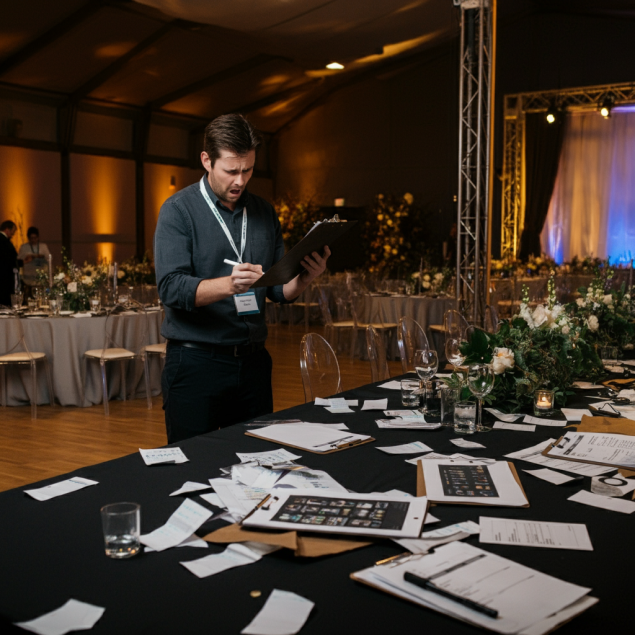Top Event Planning Challenges & How to Address Them
Planning
Top Event Planning Challenges & How to Address Them
BoomPop Team · 10/23/2024Like any major project, planning an event comes with lots of moving parts that all inter-depend on one another, which means that one challenge might create a domino effect in the planning process. The good news? Some of the most frustrating event planning challenges aren’t completely unpredictable - if you know what to look out for! So, we tapped into our event planning expertise to gather up some of the top event planning challenges - and asked our experts for advice on how to address (or avoid!) them.
How to Address the Top Event Planning Challenges
Let’s take a look at these top event planning challenges - and more importantly, what you can do about them!
Project Management is Time Consuming & Fragmented
Before, during, and after your event, managing an ever-growing number of emails, keeping track of important details and changes, and coordinating responses with guests and vendors - it’s a lot to manage and keep track of!
Many event organizers feel overwhelmed by the project management demands of planning an event.The best thing to do?
Streamline all of your communication notes in one place so you can easily see where you are without having to flip between emails and DMs constantly. This can work using a retreat planning spreadsheet, or a tool like Asana or Trello to track dependencies.Better yet, the BoomPop platform helps you keep this information all in one place easily with a focus on the details that are relevant to an event. Get easy access to critical information like hotel responses with cost comparisons and images all on one dashboard, as well as guest management tools that track RSVPs, dietary restrictions and so much more.
2. Guest RSVPs Change & Fluctuate Over Time
We all wish every event guest knew their exact plans and that their initial RSVP was set in stone, but in reality, that won’t always be the case. This can create budgeting and planning a moving target that adds extra stress to the planning process.
The best thing to do?
One of the best ways to avoid changes in guest RSVPs busting your budget is to pad your guest list and collaborate with vendors to secure a guest range. This helps you minimize overspending or overestimating.
Pro tip: Create a firm cut-off date for RSVPs, and use a platform that helps you manage guest RSVPs seamlessly and in real time. Knowing your actual RSVP cutoff date will help you better plan. Coordinate vendor cutoff dates for decisions that would impact quantity, budget, and vendor changes so they hit after your internal RSVP cutoff and subsequent planning deadlines have passed.
3. Staying on Budget is a Constant Effort
Another common event planning challenge is staying on budget. Most people think of their budget as a single, solitary number. In reality, your event budget is a living, breathing document. Changes in RSVPs, vendor estimates vs. actual numbers, vendor switches, and everything in between can impact it. A guest you didn’t think would attend is now attending? Expect to add another flight, another hotel room, another meal for each breakfast, lunch, and dinner—maybe even a larger shuttle to transport guests to activities. All of this adds up and can make hitting your budget seem impossible if you aren’t prepared.
The best thing to do?
Our expert event planners work with clients every day to make sure they’re future-proofing their event budgets for the unexpected.While planning your budget, it’s a good idea to pad each line item by rounding up. We usually recommend rounding up by 10-15% per line item It’s far better to over-estimate your budget in the planning phase than to under-estimate it. This gives you more wiggle room as the event date arrives to address the unexpected.
4. Vendor Cancellations Create Headaches
Our least favorite event planning challenge is when a vendor cancels, especially at the last minute. This is a headache we wish upon no one, as it can create chaos for an otherwise perfectly executed event.
The best thing to do?
During the research phase of your event plan, save a few options for every category of research (hotels, restaurants, activities, food, and drink vendors). Ones that you truly felt could be the runner-up. That way, you don’t have to restart your research; you have a backup. With the BoomPop platform, we make this easy, because your vendor selection and communication with your expert event planner is readily available on the fly with back-ups your team will love.
5. Event Research and Planning Can be a Full-Time Job
Juggling the demands of your full-time job with the high-pressure demands of planning an event can be downright exhausting (if not impossible). Finding adequate time to complete your regular work while multitasking and managing your event planning may seem like the only option, but in the end, this often puts internal event organizers behind on their other work or even leads to higher event costs overall.
The best thing to do?
Finding an event planning company that helps you save on the actual costs of hosting an event (like negotiating vendor rates or coming up with creative budget-saving ideas) can actually add up to big time and cost savings overall, so making the business case to work with event planning experts is an ideal scenario for many company event organizers. Yes, you will pay a fee to work with an event planning company, but with the right partner, the time and event cost savings may far exceed your investment in working together.
6. Navigating Guest Preferences Can Feel Impossible
Every guest has unique preferences, whether they are dietary needs, sleep accommodations, or personal circumstances that may affect how they show up at the event. Collecting and keeping track of this information can be a challenge, but these details make a huge impact on each guest’s event experience.
The best thing to do?
For a DIY event, your best bet is to send out a survey ahead of the event to collect responses and save all the information in a spreadsheet categorized by each employee’s name. While this can work in a pinch, it isn’t fool-proof and may require regular updates and inquiries - one more detail to regularly manage. When you work with BoomPop, we make managing guest preferences a breeze. With our integrated event pages and RSVP management, you can prompt each guest to share their dietary and accommodation needs. And, with our new integrated survey tool, you can easily send surveys before or after an event to get guest feedback during the planning process and gather input after the event.
7. Last-Minute Changes are Demanding
Planning an event is like show business! You have to stay flexible and adaptable when it comes to the ebb and flow of your event plan. Anything can change at any moment, especially when you’re officially on-site at the event.
Information may not have reached the right people, a vendor may be running late, someone may drop a whole tray of food, or the power may go out, etc. Last-minute changes can be hard to navigate, and communicating updates to your attendees can add even more logistical hurdles to figure out.
The best thing to do?
Reach out to every vendor a week in advance and confirm the previously discussed details. This is where you can iron out anything that may have been overlooked in communications. When working with an event partner, these are the types of behind-the-scenes details you can have them focus on to help your event run smoothly.
In the event a last-minute change does happen, make sure you have planned ahead of time for how you’ll let the right people know about the updates. With BoomPop, our platform enables seamless guest text messaging (to anyone who opts in during the RSVP process!), so letting your team know that’s how they’ll get real-time event updates can take the stress out of expecting the unexpected.
8. Updating Your Itinerary & Run of Show
Communicating what guests can expect at your event can be its own time-consuming process, since you may need to gather attendee RSVPs while simultaneously ironing out your itinerary. Not only do you have to constantly keep vendors updated on your event timeline, but you also need to keep guests in the loop, since changes might impact their personal schedule, how they pack, or their own travel plans.
The best thing to do?
As you work on your project plan, put together a run-of-show. A run-of-show is a schedule of everything that will happen at every hour of your event. When you have guests not knowing where to be and when, or people who are helping construct the event not knowing where to be and where to go, chaos erupts.
Maintaining the run of show so that everyone is clear with the most up-to-date information, will be essential. Share a simplified version with your guests (your event itinerary) and a more technical version with your planning team or sometimes vendors.
Here’s a quick look at the difference between these:
Example:
Guest-Facing Run of Show / Itinerary
9 a.m.: Breakfast Buffet in the hotel lobby
10 a.m.: Opening speech by the CEO.
Technical Planning Run of Show
8:30 a.m.: Set up the swag table for guests near the breakfast buffet.
9:00 a.m.: Begin handing out swag as guests arrive for breakfast.
9:30 a.m.: Walk through the stage area and ensure IT needs are set up for the CEO’s speech.
With an event platform like BoomPop, you can keep guests informed about the event itinerary in a centralized guest website that also tracks and manages their RSVP and attendee details.
9. Keeping Track of Event Setup & Tear-Down Needs & Assignments is Tricky
Before and after your event, you and your team will need to handle the on-the-ground efforts to bring the event to life (and wrap everything up). This includes knowing where to be and when, what vendors need to be coordinated with onsite, as well as executing the physical aspects of the plan you’ve been working on.
Keeping track of every single task, dependency, and timeline for your real-time event setup and wrap-up is an extremely detail-oriented and time-consuming process to plan.
The best thing to do?
Keep an event checklist that your team can refer to. This can include vendor names, times of drop offs, and contact information for vendors.
If everyone knows where they need to be and when, things get that much easier. The challenge is when you have teammates coming up to you while you are doing time-sensitive tasks, because they have questions that haven’t been figured out yet.
Create that checklist and watch your team work seamlessly together.
With an event planning company like BoomPop, your event planner can be onsite with you to help plan and execute these types of details, coordinate with vendors, and take some of the real-time event production work off your plate – so you can be a part of the retreat or offsite, too!
Navigate Event Planning Challenges with BoomPop
Planning an event is a lot to navigate, and sometimes challenges are unavoidable, but with an expert partner like BoomPop by your side, you can address these event planning challenges with ease and focus on making your company retreat or offsite an incredible experience for your team. Our team of experts can handle everything from venue sourcing to activity coordination, saving you time and lending our expertise to challenging negotiations. Want to learn more about working with BoomPop to plan your next company event? Contact us today for a free consultation.



























